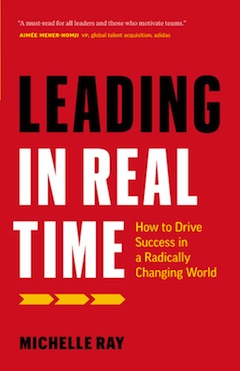Michelle Ray’s latest book is Leading in Real Time: How to Drive Success in a Radically Changing World. (photo from espeakers.com)
Michelle Ray was recently inducted into the Canadian Speaking Hall of Fame, which is bestowed, in part, for excellence in “educating others to excel.” Of course, it is awarded to exemplary speakers, but Ray also educates using the written word. Her articles have appeared in various publications and she is now the author of two books: Lead Yourself First! Indispensable Lessons in Business and in Life, which was released in 2014, and Leading in Real Time: How to Drive Success in a Radically Changing World, which just came out in the fall of 2021.
Originally from Australia, Ray started her career in media and advertising while living there. She established her own business – as a professional speaker, leadership educator and consultant – in 1995, after she settled in Vancouver. In the conclusion of her new book, she shares what she learned from her parents, who were Holocaust survivors and faced several other challenges in their lives. Though they passed away many years ago, Ray writes, “the enormity of their respective losses is still with me…. They were truly my greatest mentors, and I believe there will never be another generation like theirs. As leaders, we have much to learn, appreciate and apply from their timeless legacy.”
The three lessons Ray highlights in this chapter are to be prepared for unanticipated events, to be optimistic and resilient in the face of difficulties, and to control what you can: “The now is all we know. It’s what we have. It’s the sum total of present moments and what we choose to do with them that prepares us for the unknown.”
 Ray started writing Real Time in 2018, taking notes while traveling for speaking engagements and doing other work. Her schedule got so busy that the book project was set aside until January 2020. “Several months into the process,” she writes, as the pandemic hit, “it occurred to me that my teachings about leaders remaining relevant, flexible and open to new ideas applied to me. Realizing that the world had forever changed, I found myself questioning not only what lay ahead, but my own identity as a leadership expert and whether or not I had the energy to persevere in the face of so much uncertainty. I developed a deeper affinity with the challenges and struggles my clients faced, wanting to explore them further. I became more intrigued by their passion, ongoing success and commitment to the well-being of their workforce during a very difficult period.”
Ray started writing Real Time in 2018, taking notes while traveling for speaking engagements and doing other work. Her schedule got so busy that the book project was set aside until January 2020. “Several months into the process,” she writes, as the pandemic hit, “it occurred to me that my teachings about leaders remaining relevant, flexible and open to new ideas applied to me. Realizing that the world had forever changed, I found myself questioning not only what lay ahead, but my own identity as a leadership expert and whether or not I had the energy to persevere in the face of so much uncertainty. I developed a deeper affinity with the challenges and struggles my clients faced, wanting to explore them further. I became more intrigued by their passion, ongoing success and commitment to the well-being of their workforce during a very difficult period.”
There are eight traits of a “real-time leader,” according to Ray. A real-time leader is transformative, emotionally intelligent, open-minded, humble, exceptional at listening, optimistic, consistent and trustworthy, and authentic. She explains each of these characteristics in more depth and examines the ways in which the workplace, workers and the economy have changed, and continue to change. She offers takeaways at the end of every chapter, as well as some homework, or what she calls real-time action steps. She suggests ways in which leaders having trouble with any aspect of leadership can improve, including hiring a coach or working with a mentor.
It’s not just a matter of personal growth. “There is a high cost to poor leadership choices,” she writes. “Especially when rolling the dice on leaders who are unprepared or who are incapable of immediately assessing real-time situations, including ongoing volatility, pressure from key stakeholders, and shifts in employee expectations.”
And yet, according to Gallup research cited by Ray, “companies in an array of industries put the wrong leaders into the wrong job over 80% of the time” and “65% of managers are not engaged or are actively disengaged. That’s not the workforce,” she writes. “That’s the leadership.”
It might sound obvious that disengagement compromises employee retention but Ray notes how often leaders do not move with the times, and hold on to outdated approaches. She recommends change management education so that leaders can model behaviour for their team regarding adapting to such things as technological innovation, as well as social advances, like women’s equality. Accountability is key and Ray offers readers of her book many ways “to recognize when they have a me problem rather than a we problem.” For example, do you step in to help when needed, are you respectful of others, do you keep your promises?
In the chapter on the human factors at play in running a business, Ray notes that “intelligence and self-awareness are traits that do not always come hand in hand.” But being self-aware and capable of learning – from experiences and from other people, including those working for you – is vital for someone wanting to be a capable leader.
For more on Ray, her books and learning programs, visit michelleray.com.

